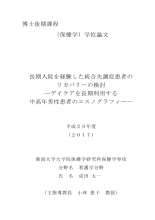長期入院を経験した統合失調症患者のリカバリーの検討 : デイケアを長期利用する中高年男性患者のエスノグラフィー 長期入院を経験した統合失調症患者のリカバリーの検討 : デイケアを長期利用する中高年男性患者のエスノグラフィー
Access this Article
Author
Bibliographic Information
- Title
-
長期入院を経験した統合失調症患者のリカバリーの検討 : デイケアを長期利用する中高年男性患者のエスノグラフィー
- Other Title
-
長期入院を経験した統合失調症患者のリカバリーの検討 : デイケアを長期利用する中高年男性患者のエスノグラフィー
- Author
-
成田, 太一
- University
-
新潟大学
- Types of degree
-
博士(保健学)
- Grant ID
-
甲第4486号
- Degree year
-
2018-03-23
Note and Description
I.研究背景 日本の精神病床数の人口比はOECD諸国で最も高く、「精神障害者地域移行・地域定着支援事業」が政策として実施されているにも関わらず、長期入院患者の地域移行は進みにくい現状がみられている。精神障害者の地域移行に向けた支援において、当事者の人生の希望や目標を重視するリカバリー概念が注目されている(Deegan, 1988)。地域移行において、長期入院を経験した統合失調症患者の意向や生活実態が反映されにくい現状の中で、リカバリーを支援していくためには、当事者のものの見方や考え方、生活実態を踏まえながら検討していく必要がある。 II.研究目的 長期入院を経験しデイケアを長期利用する中高年期の男性統合失調症患者の病状管理も含めた生活実態を当事者の視点から記述し、リカバリーの概念を用いて検討することにより、支援への示唆を得ることを目的とした。なお、多様化しているリカバリーの概念を明確にするため、国内外の先行研究による概念分析により「地域で生活する統合失調症患者のリカバリーの概念」として、【自分自身を客観視し肯定的なセルフイメージをもつ】【主体的に支援を活用し病状が安定する】【新たな目標や願望を見つけ主体的に生活する】【地域社会で相互関係を築き承認される】を設定した。 III.研究方法 当事者の立場から、彼らの生活や文化を真に理解するため、エスノグラフィーの手法を用いた。長期入院を経験しデイケアに3年以上通所する40歳以上の男性統合失調症患者9人を対象とした。研究者は9か月の予備的フィールドワークを経た後、1年1か月のフィールドワークを行い、デイケアや家庭訪問による参加観察やインタビューを実施した。フィールドノートや逐語録等から、参加者一人ひとりの病状管理を含めた生活の実態を記述し、特徴的な場面を抽出しテーマを設定した。本研究は、新潟大学大学院保健学研究科研究倫理審査委員会の承認を得た(承認番号:第122号)。
Ⅳ.結果 参加者の入院期間は平均20.8年、デイケア利用期間は平均8.8年、利用頻度は週4回が6人(66.7%)、家族構成は独居が6人(66.7%)であった。参加者の地域における生活の特徴として「地域での生活を継続する条件としての病状安定」、「支援の主体的な活用による日常生活の維持」、「長期入院による社会的なつながりの喪失と孤独」、「デイケアメンバーとのつながりの継続」、「地域住民とのゆるやかな交流の希求」が抽出された。参加者は、地域における生活を継続するためには病状の安定が必要であると理解し、デイケアや訪問看護といった多様なサポートを主体的に利用していた。発病をきっかけに、それまでに培った友人や仕事を通じた仲間等とのつながりも途絶え、入院中に両親が他界するなど、長期入院により多くの関係性を喪失し孤独を感じていたが、デイケアメンバーを中心としたつながりを構築していた。地域で暮らしながらも地域住民との交流がほとんどないなかで、地域コミュニティの中で社会的な役割を果たす一員として位置づけられることは期待せず、地域住民とはゆるやかな交流を求めていた。 Ⅴ.考察 参加者は、専門職等から多様なサポートを得ることで病状を安定させ日常生活を維持するとともに、長期入院により多くの関係性を喪失し地域における生活に孤独を感じるなかで、デイケアにおいて帰属感を得てつながりを構築し、何とか孤立せずに生活を送っていた。これらの生活の実態と先行研究を用いて生成したリカバリーの概念を比較検討した結果、【自分自身を客観視し肯定的なセルフイメージをもつ】、【主体的に支援を活用し病状が安定する】、【新たな目標や願望を見つけ主体的に生活する】ことは、当事者の実態とも合致していた。一方、【地域社会で相互関係を築き承認される】ことは、参加者の生活の実態からは実現が難しいという課題がみられた。地域住民との社会的なつながりを構築するためには、長期入院により多くの関係性を喪失した当事者が地域コミュニティの一員として受け入れられるよう、海外ですでに行われている入院早期からの就労支援や、専門職による地域住民と当事者の話合いの機会の設定が重要であることが示唆された。
1. Backgrounds Long-term hospitalized patients in Japan require support when being discharged and for living in local communities. The concept of “recovery” was originated and became popular internationally. It emphasizes the process of finding new meaning and a purpose in life for people with mental illness while living with their symptoms. It would be useful to consider the recovery based on the social conditions in Japan, where the number of long-term hospitalized elderly patients is increasing. 2. Purposes Conditions of community life of long-term hospitalized schizophrenia patients were investigated using ethnographic methods. Moreover, the recovery was examined from patients’ perspectives. Furthermore, effective methods for supporting patients are discussed. The recovery was defined through concept analysis as “objectively perceiving the self and having a positive self-image,” “proactively utilizing support and stabilizing the circumstances,” “finding new aims and hopes, and living an independent life,” “develop mutual relationships and get approved by community members.” 3. Methods A Qualitative and an inductive study was conducted using ethnographic methods. Participants were male schizophrenia patients aged over 40 years (N=9). They had experienced over three years of hospitalization and were using daycare centers for a long time period. Fieldwork, participant observations, and semi-structured interviews were conducted during 13 months. Based on the data, each participant’s life history and conditions of community life were described as stories. Moreover, characteristic scenes portraying the management of the illness and life were extracted, and themes were developed. 4. Results On average, the length of hospitalization was 20.8 years and the period of daycare use was 8.8 years. As for resident status, 6 people were living alone (66.7%) and as for services, 6 people were using daycare 4 times in a week (66.7%). Themes of their community life included, “stabilizing the illness,” “living their everyday life by utilizing different types of support,” “social isolation and loneliness caused by long-term hospitalization,” “maintaining relationships with daycare members,” and “seeking to moderate interactions with residents.” Participants had lost the relationships they had with people around them after they developed schizophrenia. Moreover, they could not work or play certain roles in the community after leaving the hospital, and as a result, their social network became highly limited. 5. Discussion The recovery extracted by concept analysis indicated the following. The following were deemed applicable to improve the community life of participants: “objectively perceiving the self and having a positive self-image,” “proactively utilizing support and stabilizing the circumstances,” “finding new aims and hopes, and living an independent life.” However, it was difficult for middle and old aged participants to “develop mutual relationships and get approved by community members.” Therefore, support is required for developing relationships between patients and community members. Furthermore, support for employment from an early period of hospitalization is necessary.
学位の種類: 博士(保健学). 報告番号: 甲第4486号. 学位記番号: 新大院博(保)甲第24号. 学位授与年月日: 平成30年3月23日
新大院博(保)甲第24号
開始ページ : 1
終了ページ : 51


